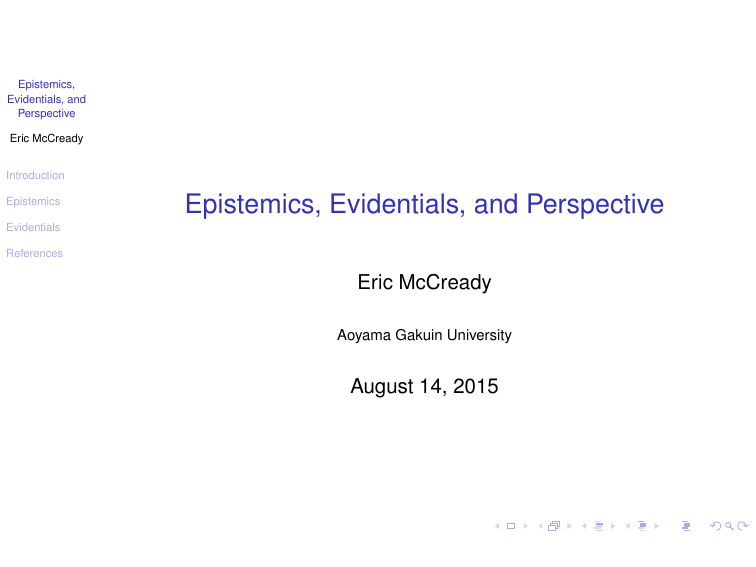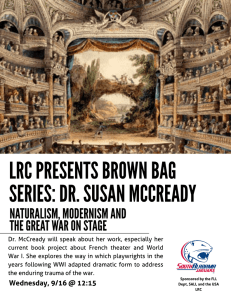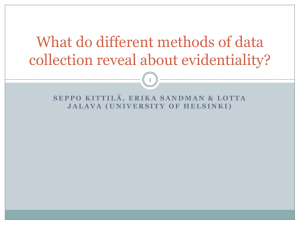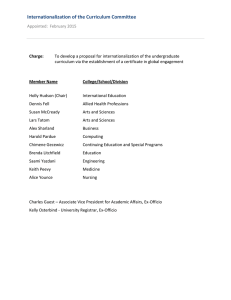Epistemics, Evidentials, and Perspective Eric McCready August 14, 2015 Aoyama Gakuin University
advertisement

Epistemics,
Evidentials, and
Perspective
Eric McCready
Introduction
Epistemics
Epistemics, Evidentials, and Perspective
Evidentials
References
Eric McCready
Aoyama Gakuin University
August 14, 2015
Overview
Epistemics,
Evidentials, and
Perspective
Eric McCready
Introduction
Epistemics
Goal:
Evidentials
I
Introduction to epistemic modality and evidentiality
References
I
Main point: connections to perspectivality
I
Secondary point(s):
I
I
Brief introduction to semantics of epistemic modals and
interpretation
Slightly less brief introduction to evidentiality
Epistemic modality
Epistemics,
Evidentials, and
Perspective
Eric McCready
Introduction
Epistemics
Evidentials
References
Two standard accounts of epistemic modals: Kratzer (1981) and
that of Veltman (1996).
I
Both use a possible worlds semantics.
Kratzer: a sentence with a possibility modal is true iff there is some
epistemic alternative to the actual world in which the sentence is
true.
I
This is a modification of a quite standard view from modal
logic.
The notion of epistemic alternative:
I
In standard ML, a world indistinguishable from the actual
world given the knowledge of some agent.
I
Usually modeled with an accessibility relation R which has
certain properties:
I
reflexivity, transitivity, symmetry [equivalence relation].
Epistemics,
Evidentials, and
Perspective
Eric McCready
Introduction
Kratzer defines notions of modal base and ordering source.
Epistemics
I
Modal base ∼ accessible worlds.
Evidentials
I
Ordering source: preference relation on those worlds.
References
Here, put aside ordering source for simplicity.
(1)
Simplified Kratzer/modal logic for epistemic possibility
modals:
M , w |= ^e come party (john) iff
∃w 0 [wRepist w 0 → come party (john)(w 0 )]
Epistemics,
Evidentials, and
Perspective
Veltman: dynamic semantics for modality.
Eric McCready
I
In dynamic semantics, meanings are viewed as context
change potentials.
I
Change in information states, viewed as sets of (epistemically
possible) worlds.
I
Veltman: ^ is a global test on information states, passed for a
proposition ϕ if ϕ is verified by some state.
Introduction
Epistemics
Evidentials
References
More formally (where σ[ϕ] indicates the result of updating σ with ϕ,
and propositions are also viewed as sets of worlds, as usual):
(2)
Veltman semantics
for epistemic possibility modals
σ[^ϕ] =
σ if σ ∩ ϕ , ∅
∅ else
What agent?
Epistemics,
Evidentials, and
Perspective
Eric McCready
Introduction
Epistemics
Evidentials
The above make a claim about the function of EMs:
I
References
They indicate that a given proposition is compatible with an
agent’s information.
But what agent?
I
The standard (hidden) assumption: the speaker.
But this is not always obviously the case.
Epistemics,
Evidentials, and
Perspective
Eric McCready
(3)
Introduction
Epistemics
Evidentials
References
Sally. Joe might be in Boston.
George. He cant be in Boston. I saw him in the hall five
minutes ago.
(i). Sally: Oh, then I guess I was wrong.
(ii). Sally: Oh, OK. So he cant be in Boston. Nonetheless,
when I said Joe might be in Boston, what I said was true,
and I stand by that claim.
Bond villain vs Bond ally:
(4)
Bond might be in Zürich.
True? Or False?
Perspectives
Epistemics,
Evidentials, and
Perspective
Eric McCready
Introduction
Epistemics
Evidentials
DeRose (1991) (among others): EMs do make claims about the
compatibility of their prejacents with an information state.
I
The relevant information state is not necessarily that of the
speaker.
I
Can be relative to some other contextually salient individual;
I
or joint (or private) knowledge of the members of some salient
group.
References
The view, then, is a standard contextualist one about epistemic
modality.
Dynamic relativism
Epistemics,
Evidentials, and
Perspective
Eric McCready
Introduction
Epistemics
Evidentials
References
However it can be realized in terms of points of evaluation as well.
I
Veltman-style relativist semantics:
I
Interpretation of ^φ in context hg , t , w , c , k i gives
σa (k ) if σa (k ) ∩ ϕ , ∅
σa (k )[^ϕ] =
∅
I
else
So information state relativized to perspectival center a(k ).
Epistemics,
Evidentials, and
Perspective
Eric McCready
EMs subject to standard shifting effects . . .
Introduction
Epistemics
(5)
Might John be at the party?
Evidentials
(6)
John thinks it might rain.
References
. . . and are also capable of inducing shifting:
(7)
The cat food might/must be tasty.
Amenable to a monstrous treatment:
I
operator shifting e-index,
I
(optional) operator associated with ^/ shifting other indices.
Evidentials:
Epistemics,
Evidentials, and
Perspective
Eric McCready
Introduction
Evidentials are expressions indicating something about speaker’s
basis for a speech act.
(8)
a.
Epistemics
Evidentials
References
b.
c.
Para-sha-n-mi
rain-PROG-3-MI
‘It is raining. + speaker sees that it is raining’ (Quechua)
It must be raining.
(seeing a dripping umbrella)
ame-ga futteiru soo
desu
rain-Nom falling HEARSAY Cop
‘It is raining (I heard).’
(Japanese)
Extensive prior research by typologists (e.g. Chafe and Nichols
1986; Mithun 1986; de Haan 1999; Aikhenvald 2003, 2004):
I
interesting typological generalizations
I
grammaticalization, etc.
Epistemics,
Evidentials, and
Perspective
Eric McCready
Introduction
Epistemics
Evidentials
References
In recent years there has been a good deal of formal semantic
work on evidentiality.
I
Scope behavior, ‘levels of meaning’, etc.
I
Content of evidentials
I
Update: Analogous with assertions? Or with modal updates?
I
Asserted or not?
Some issues settled, some not (empirically or theoretically).
I
This talk: overview and relation to perspectivality.
Epistemics,
Evidentials, and
Perspective
Eric McCready
Introduction
Epistemics
Evidentials
Today’s plan:
I
Evidentials: examples and definitions
I
Some seemingly distinct semantic classes and how to
analyze them
I
Evidence and perspective
References
What is an evidential?
Epistemics,
Evidentials, and
Perspective
Eric McCready
Introduction
Epistemics
Evidentials
References
Aikhenvald (2004) provides the following criteria for evidentials:
1. Evidentials indicate the source of justification for factual
claims;
2. Indication of evidence source is the primary meaning of
evidentials (i.e. it does not follow pragmatically);
3. Evidentials are usually not used when the fact in question is
known directly to both speaker and hearer (and, if used, have
a special pragmatic significance).
(3) might well be a special case of more usual restrictions on
assertion.
I
I think it can be disregarded.
Epistemics,
Evidentials, and
Perspective
Eric McCready
Introduction
Thus evidentials indicate evidence source as their ‘primary
meaning.’
I
Epistemics
“Primary meaning” should be understood as: ‘part of literal
content’
Evidentials
I
References
I
I
I
I
I
not implicated, etc.
Seems fair to include presupposition, conventional
implicature, etc., under this rubric.
Possibly nontrivial to determine what counts as literal content
(eg. Cappelen and Lepore 2005);
basically rely on intuitive understanding here.
Perhaps more is intended but difficult to make this precise . . .
intuitively it should be at least as ‘important’ as any other part
of the content of the expression.
Epistemics,
Evidentials, and
Perspective
Point of contention in the literature: exegesis of ‘for factual claims’.
Eric McCready
Introduction
Epistemics
I
What do we mean by ‘factual claim’ here?
I
Suppose I assert φ + Evid. Then my claim could be: φ or
Opφ.
Evidentials
I
References
(Op some operator which is part of the content of the
evidential)
I
If ‘φ’ then: evidentiality not part of asserted content
I
If ‘Opφ’ then: evidentiality part of asserted content
I
A major split between definitions and between accounts, as
we’ll see.
Have to be a bit careful about interaction between evidential and
assertion on the second type.
Epistemics,
Evidentials, and
Perspective
Eric McCready
Introduction
Epistemics
What then counts as an evidential? Lots of things.
Evidentials
1. Certain modals: English ‘must’, German sollen
References
2. Various affixes (Quechua, others)
3. Other modal-like forms (Japanese, St’at’imcets)
4. Even: embedding verbs of e.g. perception
In the following: focus on types 2 and 3.
Epistemics,
Evidentials, and
Perspective
Eric McCready
Introduction
Epistemics
To get a better sense, some specific examples and analyses.
I
References
Cuzco Quechua/Faller (2002)
I
Evidentials
I
Japanese/McCready and Ogata (2007)
I
I
Evidentials as speech act modifiers
Evidentials as modals + evidence presupposition (effectively)
Cherokee/Murray (2010)
I
Evidential meanings as ‘not-at-issue assertion’
In the process we’ll have occasion to consider some other recent
formal accounts.
Quechua: data
Epistemics,
Evidentials, and
Perspective
Eric McCready
Introduction
Epistemics
Evidentials
Cuzco Quechua has several enclitic suffixes that mark evidentiality.
Faller analyzes three suffixes in detail:
I
-Mi indicates that the speaker has direct (usually perceptual)
evidence for the claim.
I
-Si indicates that the speaker heard the information
expressed in the claim from someone else.
I
-Chá indicates that the speaker’s background knowledge,
plus inferencing, leads him to believe the information in the
claim true.
References
Epistemics,
Evidentials, and
Perspective
Eric McCready
Introduction
A representative case:
(9)
a.
Epistemics
Evidentials
References
Para-sha-n-mi
rain-PROG-3-MI
‘It is raining. + speaker sees that it is raining’
b.
para-sha-n-si
rain-PROG-3-SI
c.
para-sha-n-chá
rain-PROG-3-CHÁ
‘It is raining. + speaker was told that it is raining’
‘It may/must be raining. + speaker conjectures that it is
raining based on some sort of inferential evidence’
Quechua: analysis
Epistemics,
Evidentials, and
Perspective
Eric McCready
Introduction
Epistemics
Evidentials
Faller uses Vanderveken’s (1990) speech act theory for her
analysis.
I
Speech acts have preconditions for successful performance.
References
I SINC :
sincerity conditions on successful performance of the
SA. For assertions, that Bel (s, p) holds—that the speaker
believes the content of the assertion.
I
In large part, the focus of Faller’s analysis is on the sincerity
conditions for the assertion.
Epistemics,
Evidentials, and
Perspective
Eric McCready
I
Introduction
Epistemics
Evidentials
-mi adds an additional sincerity condition: that Bpg (s, p). The
formula Bpg (s, p) means that the speaker has the best
possible grounds for asserting p.
I
References
I
BGP depends on asserted content: perception, even hearsay,
...
Faller analyzes -chá as being simultaneously modal and
evidential:
I p is mapped to ^p, as is the corresponding belief object
Bel (s, p) in SINC.
I The condition Reasoning (s , Bel (s , ^p )) is also added to
SINC .
Epistemics,
Evidentials, and
Perspective
Eric McCready
Introduction
Epistemics
Evidentials
References
I
-Si is also complex; the propositional content p is not
asserted when this hearsay evidential is used.
I
I
Faller posits a special speech act PRESENT for this situation,
on which the speaker simply presents a proposition without
making claims about its truth.
Therefore Bel (s, p) is eliminated from SINC, and the condition
∃s2 [Assert (s2 , p) ∧ s2 < {h, s}] is added to the set of sincerity
conditions.
Embedding
Epistemics,
Evidentials, and
Perspective
Eric McCready
Introduction
Epistemics
Evidentials
References
One main reason for using a speech act-based analysis is that the
Cuzco Quechua evidentials do not embed semantically.
They also cannot be ‘bound’ a la presuppositions.
(10) Ines-qa mana-n/-chá/-s qaynunchaw ñaña-n-ta-chu
Ines-Top not-MI/CHÁ/SI yesterday
watuku-rqa-n
visit-Pst1-3
sister-3-Acc-CHU
‘Ines didn’t visit her sister yesterday.’ (and speaker has
evidence for this) NOT ‘Ines visited her sister yesterday’ (and
speaker doesn’t have evidence for this)
Alternatives to speech acts?
Another way
Epistemics,
Evidentials, and
Perspective
Murray (2010): Cherokee evidentials.
(11) a.
E’-hoo’koho-∅
3-rain-dir
Eric McCready
Its raining, Im sure.
Introduction
b.
Epistemics
E’-hoo’ko?h?o-ne?se
3-rain-rpt.sg.b
Evidentials
Its raining, I hear.
References
c.
E’-hoo’ko?’h?o-neho
3-rain-nar.sg.b
It rained, it is said.
d.
M’o-hoo’ko?h’o-hane-he
cnj-rain-modB-y/n
Its raining, I gather.
Four-way distinction: direct, reportative, ‘narrative,’ inferential.
I A Quechua-like system:
I
I
I
not challengable/deniable
no embedding
Again, much like CIs.
Direct update
Epistemics,
Evidentials, and
Perspective
Eric McCready
Murray’s proposal: distinguish two kinds of assertion.
Introduction
Epistemics
I
At-issue assertion: standard content
I
Evidentials
I
References
I
Not-at-issue assertion: nonstandard content
I
I
I
I
new information (in general)
first proferred to hearer; if accepted, update
Direct update: no hearer choice about acceptance
content is ‘imposed’ on interpreter; still new information
CIs, expressives, . . .
Proposal: (illocutionary) evidential content = not-at-issue
assertion
Epistemics,
Evidentials, and
Perspective
Eric McCready
Introduction
Update comes in three parts in general (implemented in system of
Bittner 2011).
Epistemics
Evidentials
References
1. the presentation of the at-issue proposition,
2. a non-negotiable update [possibly empty],
3. and a negotiable update.
For evidentials:
I
(1) propositional content; (2) evidential content; (3) what to do
with propositional content.
Can also be viewed as a possible model of CI/expressive content.
Epistemics,
Evidentials, and
Perspective
Eric McCready
Introduction
Predictions:
I
I
Epistemics
I
Evidentials
References
Not at issue means . . .
not challengable
unable to embed
I
Basically a lexical stipulation though.
I
Quite similar to CI view at the end;
I
Murray’s arguments against CI story (2010:139) don’t apply to
+
LCI
analysis
Clear: illocutionary analysis not the only possibility.
I
Now let us consider a qualitatively different type: ‘epistemic
evidentials’
Japanese
Epistemics,
Evidentials, and
Perspective
Eric McCready
Introduction
Japanese evidentials: inferential mitai, yoo, rashii, (Inf-)soo, and
hearsay (S) soo, rashii (McCready and Ogata, 2007).
(12) a.
Epistemics
Jon-wa konya-no paatii ni kuru rashii/mitai/yoo
John-Top tonight-Gen party to come RASHII
‘It seems that John will come to the party tonight.’
Evidentials
References
b.
Jon-wa konya-no paatii ni kuru soo-da
John-Top tonight-Gen party to come SOO-Cop.pres
c.
. . . ki-soo-da
. . . come-SOO-Cop
‘I heard that John will come to the party tonight.’
Some differences exist between the inferentials in . . .
I
evidence source possibilities
I
aspect (infinitive/inferential soo induces immediacy with
nonstatives
M&007
Epistemics,
Evidentials, and
Perspective
Eric McCready
Inferential evidentials modeled via operator 4ia , where i indexes
an evidence source and a is an agent. Informally:
Introduction
Epistemics
Evidentials
References
(13) 4ia φ is true given a world w, time s, and probability function µ
iff:
a.
b.
c.
φ was less likely according to a at some time preceding
s (before introduction of some piece of evidence i);
φ is still not completely certain for a at s (given i);
the probability of φ for a never decreased between the
time a became aware of the evidence i and s as a result
of the same piece of evidence i (convexity).
Existence of piece of evidence is effectively a presupposition (cf.
pronouns; Geurts 1999).
Epistemics,
Evidentials, and
Perspective
Eric McCready
Introduction
Epistemics
Evidence itself was modeled with a predicate E. This predicate
also serves a complex function. Informally, it works as follows:
Evidentials
(14) Eia ϕ . . .
References
a.
b.
changes the probabilities assigned to every proposition
ψ (excluding ϕ itself) in the current information state σ
by replacing them with the conditional probability of ψ
given ϕ, if defined
replaces the modal accessibility relation with one
restricted to worlds in which ϕ holds.
Epistemics,
Evidentials, and
Perspective
Eric McCready
Introduction
Epistemics
Evidentials
This account is meant as a treatment of what evidence does in a
context;
I
it changes the probability of other propositions that are
related to it conditionally (14a),
I
and revises the set of accessible possibilities to one
containing only those possibilities that make the content of
the evidence true (14b).
References
The latter just amounts to learning new information.
Epistemics,
Evidentials, and
Perspective
Eric McCready
Introduction
Epistemics
Evidentials
References
The hearsay evidential on the other hand was modelled with an
operator Ha , a dynamic test, understood as follows.
(15) Ha ϕ indicates that a has experienced an event of acquiring
hearsay knowledge Eha ϕ, at some past time.
So evidentials simply introduce semantic operators,
I
which can scope over and under other bits of content as
usual,
I
unlike what happens if they’re tied to speech acts
I
or other kinds of content with scope restrictions (CIs).
Embedding
Epistemics,
Evidentials, and
Perspective
Eric McCready
Introduction
Epistemics
Evidentials
One main reason for treating J-evids as semantic operators: easily
take narrow scope.
(16) a.
References
Taro-ga kuru yoo da-ttara
osiete kudasai
Taro-Nom come YOO Cop.Pres-COND teach please
‘If it looks like Taro will come, please tell me.’
b.
Taro-ga kuru soo da-ttara
osiete kudasai
Taro-Nom come SOO Cop.Pres-COND teach please
‘If you hear that Taro will come, please tell me.’
If just operators, they can easily scope under other operators.
Epistemics,
Evidentials, and
Perspective
Eric McCready
Introduction
Epistemics
Evidentials
References
Evidentials can also embed under modals and negation, as in the
following case.
Context : Mika is in love with Taro and always waits for him if she
thinks he’s going to show up. We were supposed to meet Mika
somewhere but she never appeared.
Here it would be fine to say the following, indicating that we think
Mika might be waiting for Taro somewhere else.
(17) mosikasitara Taro-ga
maybe
kuru yoo datta kamosirenai
Taro-Nom come YOO cop.Pst possibly
‘Maybe it looked like Taro would come.’
Epistemics,
Evidentials, and
Perspective
Eric McCready
Introduction
Epistemics
Evidentials
References
A difficult question: what is evidence for natural language?
I
Without an answer, theories of evidentials partly undefined
But can we just ignore the question as linguists?
I
‘Leave it to the philosophers’
I
But: why should NL evidence be identical to e.g evidence in
philosophy of science?
Evidence, intuitively
Epistemics,
Evidentials, and
Perspective
Eric McCready
Introduction
Epistemics
Evidentials
What does evidence do? The obvious answer is that it provides
justification for certain beliefs.
I One way to think about this justification is by means of
changes in the probabilities assigned to the content of those
beliefs.
What is the notion of probability we have in mind here?
References
I
The objective, or classical, probability of ϕ is, roughly, the
fraction of total possible outcomes in which ϕ is true
|{w : ϕ(w )}|
OP (ϕ) =
|W |
The subjective probabilityis the degree of belief in ϕ an agent
a has
|{w : w ∈ Doxa ∧ ϕ(w )}|
SPa (ϕ) =
.
|Doxa |
Observe that the latter is explicitly perspectival.
I
Which to prefer?
Epistemics,
Evidentials, and
Perspective
Eric McCready
Seemingly, subjective probabilities.
I
Introduction
Epistemics
Evidentials
References
Explicitly adopted by McCready and Ogata (2007); Davis
et al. (2007).
The problem is that it is not clear that everything that changes
subjective probabilities is necessarily evidence.
I Consider the following scenario, based on one in Williamson (2000).
$1. A lottery ticket is 1 but a hot dog costs
$1.50. I am hungry and want a hot dog.
I Suppose that I have
I I have no reason to believe that any lottery ticket I buy will win; but
as I get hungrier I begin to convince myself that the chance of
winning is good—though I may know the odds.
I
=⇒ The subjective probability of a winning ticket increases.
Wishful thinking can count as evidence if no more is said.
K vs B
Epistemics,
Evidentials, and
Perspective
Eric McCready
Introduction
Epistemics
Evidentials
References
Do we want to say that evidence must be knowledge? (cf.
McCready 2010)
I
To be discussed.
But how to tell knowledge from belief?
I
Here is a traditional answer from epistemology: knowledge is
justified true belief.
I
I can be said to know p if I believe p, p is true, and I have
good reason to believe p
This answer looks reasonable. But it is wrong.
Epistemics,
Evidentials, and
Perspective
Eric McCready
Introduction
Gettier (1963): cases in which all the conditions above are met, but
still there is no knowledge. Here is a scenario in the Gettier style.
I
Johnny is traveling in the country when he sees what looks to
him like a horse on top of a hill and hear a horse neigh.
I
However, what he sees is a horse-shaped rock, and the neigh
is just the wind whistling through that pipe over there.
I
But there is—coincidentally—a horse standing behind the
rock.
Epistemics
Evidentials
References
(18) Johnny knows there is a horse on top of the hill.
This statement seems false–though the conditions listed are
satisfied.
I
How do evidentials behave in such situations?
Evidentials in Gettier scenarios
Epistemics,
Evidentials, and
Perspective
Eric McCready
Introduction
A characteristic of Gettier cases:
I
The Gettiered individual is Gettiered because of non-general
facts about the world.
I
So while the justification the Gettiered individual has for his
beliefs is not well-founded,
I
this lack of justification can be apparent to other individuals in
the Gettier case.
Epistemics
Evidentials
References
Thus we see that being Gettiered is a perspective-dependent
problem: only the Gettiered individual is necessarily Gettiered.
I
We might anticipate that we find complex patterns wrt
evidential usage in GSs.
Indeed we do
Epistemics,
Evidentials, and
Perspective
Eric McCready
Unsurprisingly, the Gettiered individual can assert an evidential
with respect to his putative knowledge:
Introduction
Epistemics
Evidentials
References
(19) ano oka-no ue-ni
uma-ga
iru mitai da
that hill-Gen top-Dat horse-Nom exists EVID Cop
‘There appears to be a horse on top of that hill.’
Johnny of (18))
(said by the
For the outside observer the situation is a bit more complex. We
can distinguish two cases.
1. The observer knows that Johnny’s warrant for belief is no
good, but does not know whether there is actually a horse.
2. The observer knows both that Johnny’s warrant is no good
and that there is a horse.
Epistemics,
Evidentials, and
Perspective
Eric McCready
Introduction
Epistemics
Evidentials
In both of these cases, (19) is bad. But it is bad for different
reasons.
I
References
In Case 1, it is bad because of clause (2a) of the definition of
the inferential evidential.
I
I
The outside observer has no piece of evidence—that is, no
piece of knowledge, since Johnny’s putative evidence is
useless—that increased the probability that there is a horse
on the hill to the necessary level.
This makes use of the evidential by the observer impossible.
Epistemics,
Evidentials, and
Perspective
Eric McCready
Introduction
Epistemics
Evidentials
References
I
In Case 2, the observer runs afoul of clause (2b).
I
Since the observer knows that there is a horse, the probability
of there being a horse is 1; she is completely certain that
there is a horse, and the evidential sentence cannot be used.
This situation involves something closer to a Gricean violation,
modeled in the theory of McCready and Ogata (2007) as
something akin to Veltman’s (1996) examples with epistemic
modalities:
(20) # It is sunny . . . It might be sunny.
If we know that it is sunny, it is not helpful to assert the possibility.
The evidential case is analogous.
Epistemics,
Evidentials, and
Perspective
Eric McCready
A question wrt evidentials in Gettier scenarios arises concerning
the distinction between assertability and truth evaluation.
I
Introduction
Is (19) assertable?
I
Epistemics
Evidentials
I
References
I
By Johnny, yes; in his Gettiered state, he believes that he has
evidence enough to make it true, so he can utter it sincerely.
By a non-Gettiered observer, however, it is not assertable, as
we just saw: for the observer, the sentence is either false or
out for Gricean reasons.
So we see that the perspective taken matters for assertability
in Gettier contexts.
A related question: Is (19) true?
I
Johnny himself will take (19) to be true—as will anyone
Gettiered along with Johnny.
I
But the outside, omniscient observer will take it to be false.
So perspective matters for truth evaluation as well.
Awareness and perspective
Epistemics,
Evidentials, and
Perspective
Eric McCready
Introduction
A further condition on evidence: agents must recognize evidence
as so.
I
A piece of evidence cannot count as evidence for an agent
unless that agent is aware that the evidence is indeed
evidence.
I
Note: purely objective notions of evidence won’t work for this
application.
Epistemics
Evidentials
References
Two roots for failure to recognize evidence as evidence.
I
One might fail to recognize the relationship between evidence
and evidenced, or lack a relevant concept.
I
I
E.g. over politeness as evidence for lack of respect, when
conventions unfamiliar
People do not use evidentials if they do not take themselves
to have evidence!
Back to the main issue
Epistemics,
Evidentials, and
Perspective
Eric McCready
Introduction
Epistemics
Question: what is evidence for natural language?
I
Evidentials
∼ question of how natural language makes use of the notion
of justification,
References
I
I
I
i.e. the justification for assertion,
and the evaluation of that justification.
Thus Q2: what notion of justification is at play in natural
language?
Let us explore some existing views of justification.
Justification and knowledge
Epistemics,
Evidentials, and
Perspective
Eric McCready
A line of demarcation: internalist vs externalist theories.
I
Internalist theories, roughly speaking, are those which take
justification to depend exclusively on the state of the agent,
i.e. on her mental states
I
Externalist theories conversely put some part of the
responsibility for justifying in the external environment.
Introduction
Epistemics
Evidentials
References
Which kind of theory looks preferable for natural language
evidentials?
I
First: simplest internalism can’t be right (hungry lottery
player).
We need:
I
either some kind of externalism
I
or a way of simulating an apparent externalism.
Gettier cases again
Epistemics,
Evidentials, and
Perspective
Eric McCready
Gettiered individuals are willing to assert evidentials.
I So we cannot have a purely externalist conception of
evidence,
I
Introduction
Epistemics
Evidentials
References
if we do, wrong prediction (assuming justificational assertion
norm).
But external observers judge such uses of evidentials false.
Plausible option: knowledge-level justification (Fantl and McGrath
2009:97).
I A (justified) belief that you are justified enough to know,
though you may in fact be mistaken.
I = higher-order beliefs about the reliability of one’s own
justification.
I Even on externalist version, weak enough to apply to
Gettiered agents:
I such agents believe that they are justified enough to have
knowledge.
Suggestion: agent-dependent KLJ.
I
Evidence: desiderata
Epistemics,
Evidentials, and
Perspective
Eric McCready
Introduction
Requirements: evidence must be . . .
Epistemics
Evidentials
References
I
sensitive to the awareness and perspectives of agents
I
able to track individuals’ beliefs about their relation to the
external environment.
I
(and how those beliefs also relate to the external
environment.)
Let us now explore options.
Knowledge
Epistemics,
Evidentials, and
Perspective
E =K
Eric McCready
I
Evidence must be knowledge
I
and also raise subjective probabilities.
I
In earlier work, I adopted this view simpliciter (McCready,
2008, 2010).
Introduction
Epistemics
Evidentials
References
But we need more.
I
What does an agent know in internal Gettier scenarios?
I
(18): is Johnny’s evidence that he sees a horse, or that he
sees a horse-like form? Probably the latter.
I
If the former, he does not know it, if the latter, clearly, he does.
I
His belief that there is a horse follows from a Millarian
‘quasi-inference’, which amounts to making the assumption
that perception is reliable (Millar, 1991).
Epistemics,
Evidentials, and
Perspective
Eric McCready
If this is correct, then assuming that evidence must be knowledge
does not help.
Introduction
Epistemics
Evidentials
I
Johnny does know his evidence.
I
The problem is in the Millarian inference.
I Independent of E = K .
I
Or (if the other interpretation), then he simply does not know,
and E = K does not help.
References
I
I
We predict that internal Gettier participants should be unable
to use evidentials, for they do not know.
Then: knowledge-level justification, which must be spelled
out.
How to do so then?
Higher-order beliefs about probabilities
Epistemics,
Evidentials, and
Perspective
Basic idea: evidence (for evidentials) involves the self-ascription of
an increase in probability based on learning.
Eric McCready
I
What kind of probability?
Introduction
Epistemics
Evidentials
Two options:
1. Subjective probabilities: possibly too weak.
References
I
Then evidentials assertable in internal Gettier cases:
I
based on the putative evidence, the agent self-ascribes a rise
in probability.
I
But externally no such probability increase is self-ascribed.
I
=⇒ evidential sentence will be assertible for the Gettiered
individual,
I
yet the uttered sentence will be judged false by the external
observer.
This is precisely as desired.
Coherent?
Epistemics,
Evidentials, and
Perspective
Eric McCready
Introduction
Epistemics
Evidentials
Possible issue: subjective probability distributions are based on
degrees of belief.
I
References
Is it conceptually possible to have a subjective probability
distribution without being aware of the probabilities that are
assigned?
If we are so aware, then self-ascription follows from subjective
probability increase.
I
Then we cannot discriminate between the cases.
I am not sure—so let me search for a patch.
Fixes
Epistemics,
Evidentials, and
Perspective
Eric McCready
I
Let introspection fail for subjective probabilities.
I
Seems drastic for the application . . .
Introduction
Epistemics
Evidentials
References
I
More complex view of introspection: uncertainty about
probabilities?
I
Highly complex view of internal states . . .
1. Objective probabilities.
I
I
I
To get perspectives, add self-ascription:
self-ascribe being in a world where the objective probability of
φ increased on the basis of the truth of ψ,
ie. a world in which ψ is evidence for φ.
2. This last looks the best option given evidence from Gettier
cases (McCready, 2014).
Proposal
Epistemics,
Evidentials, and
Perspective
Eric McCready
Introduction
Epistemics
Basic idea:
I
evidence induces increase in probability via
conditionalization,
I
and self-ascription of the property of being in a world in which
the required increase occurs.
I
The proposal thus comes in two parts:
Evidentials
References
I
I
the change in probabilities, and
the self-ascription of that change.
Epistemics,
Evidentials, and
Perspective
Eric McCready
Introduction
Epistemics
Evidentials
References
Describing evidence in terms of probability is completely
straightforward. What we want is just the following:
(21) ϕ is evidence for χ iff P(χ|ϕ) > P(χ|¬ϕ), where (χ|ϕ) is the
conditionalization of χ on ϕ.
What kind of probability?
I
Subjective: no, for reasons already discussed
I
Objective: yes, but not by itself, for mind-independent
Solution: self-ascription.
Epistemics,
Evidentials, and
Perspective
Eric McCready
Introduction
Epistemics
Evidentials
References
Self-ascription: already needed to account for other intuitive
requirements on evidence.
I
e.g. Audi insurance adjustor, general awareness.
I
We can simply make use of the framework Yasu presented on
Tuesday to handle this idea.
I
Just as with other kinds of self-ascription.
Epistemics,
Evidentials, and
Perspective
Now: subjective evidence amounts to self-ascription in a world
where such evidence exists.
Eric McCready
(22) EVID (χ, ϕ) ←→ ϕ is evidence for χ (cf. 21)
Introduction
Epistemics
Evidentials
References
Then, for ϕ to count as subjective evidence for χ with respect to
agent a, we require:
(23) SE (a, χ, ϕ)g ,t ,w ,c ,k ←→ GCDox (a, t , w ) ⊆ {c 0 :
EVID (χ, ϕ) wrt a(k ) at t (k ) in w (k )}
Unpacked:
I ϕ is subjective evidence for χ for agent a iff
I
in all of the agent’s belief-accessible worlds, ϕ is indeed
evidence for χ.
I
Use of objective probability implies that agent takes herself to
be viewing things objectively;
I
The latter amounts to implementing knowledge-level
justification.
Perspective
Epistemics,
Evidentials, and
Perspective
Eric McCready
Introduction
Key point in the above:
I
if probabilities are subjective, then explicitly perspectival;
I
if objective, then perspectival via addition of self-ascription.
Epistemics
Evidentials
References
Thus an evidential claim is always made. . .
I
on the basis of a perspective
I
and the information (state) associated with it.
This is so even for illocutionary evidentials:
I
the ‘evidential core’ contains a modal component (cf.
McCready 2015).
Shifting
Epistemics,
Evidentials, and
Perspective
Eric McCready
Introduction
Japanese:
(24) a.
Epistemics
Evidentials
Taro-wa kuru mitai nano?
Taro-Top come MITAI Q
‘Does it look like Taro will come?’
References
b.
Taro-wa kuru soo nano?
Taro-Top come SOO Q
‘Given what you heard, will Taro come?’
Note that the English ‘look like’ (in gloss) and ‘seem’ show the
same behavior (pseudo-evidentials).
(25) Does it seem like it will rain?
Epistemics,
Evidentials, and
Perspective
Eric McCready
Cheyenne (Murray 2010):
(26) a.
Introduction
‘He sang, I’m sure’
Epistemics
Evidentials
É-néméne-∅
3-sing-DIR
b.
References
Mó=é-néméne-∅?
y/n=3-sing-DIR
‘Given what you know, did he sing?’
(27) a.
É-néméne-seste
3-sing-RPT.3SG
‘He sang, I hear’
b.
Mó=é-néméne-seste
y/n=3-sing-RPT.3SG
‘Given what you heard, did he sing?’
Summary
Epistemics,
Evidentials, and
Perspective
Eric McCready
Introduction
Evidentials:
I
indicate the relationship between the source of information
and the content of a speech act
I
can differ in the kind of meaning they introduce
(illocutionary/modal)
I
involve perspectivality either by
Epistemics
Evidentials
References
1. explicit agent-relativity a la epistemic modals
2. the background notion of evidence at work in their semantics
Shifting can be analyzed monstrously
I
though shifting at the metalevel, in the evidence definition,
might be complex.
Epistemics,
Evidentials, and
Perspective
Aikhenvald, Alexandra. 2003. Evidentiality in typological perspective. In A. Aikhenvald and R. Dixon, eds., Studies in
Evidentiality, pages 1–31. Johns Benjamins.
Eric McCready
Bittner, Maria. 2011. Time and modality without tenses or modals. In R. Musan and M. Rathert, eds., Tense across
Languages, pages 147–188. Niemeyer.
Aikhenvald, Alexandra. 2004. Evidentiality. Oxford University Press.
Introduction
Cappelen, Herman and Ernest Lepore. 2005. Insensitive Semantics. Oxford: Blackwell.
Epistemics
Chafe, Wallace and Johanna Nichols. 1986. Introduction. In W. Chafe and J. Nichols, eds., Evidentiality: The Linguistic
Coding of Epistemology, pages vii–xi. Norwood: Ablex Publishing Co.
Evidentials
References
Davis, Christopher, Christopher Potts, and Peggy Speas. 2007. The pragmatic values of evidential sentences. In
M. Gibson and T. Friedman, eds., Proceedings of SALT 17 , pages 71–88. CLC Publications.
de Haan, Ferdinand. 1999. Evidentiality and epistemic modality: Setting boundaries. Southwest Journal of Linguistics
18:83–101.
DeRose, Keith. 1991. Epistemic possibilities. The Philosophical Review 100(4):581–605.
Faller, Martina. 2002. Semantics and Pragmatics of Evidentials in Cuzco Quechua. Ph.D. thesis, Stanford University.
Fantl, Jeremy and Matthew McGrath. 2009. Knowledge in an Uncertain World. Oxford University Press.
Gettier, Edmund. 1963. Is justified true belief knowledge? Analysis 23:121–123.
Geurts, Bart. 1999. Presupposition and Pronouns. Oxford: Elsevier.
Kratzer, Angelika. 1981. The notional category of Modality. In H.-J. Eikmeyer and H. Rieser, eds., Words, worlds, and
contexts: new approaches in word semantics, no. 6 in Research in text theory, pages 38–74. Berlin: de Gruyter.
McCready, Eric. 2008. Evidentials, knowledge and belief. In Y. Nakayama, ed., Proceedings of LENLS 5.
McCready, Eric. 2010. Evidential universals. In T. Peterson and U. Sauerland, eds., Evidentials and Evidence, vol. 28 of
UBC Working Papers in Linguistics, pages 105–128. University of British Columbia.
McCready, Eric. 2014. What is evidence in natural language? In Formal Semantics and Pragmatics, E. McCready, K.
Yabushita and K. Yoshimoto, eds., Springer.
McCready, Eric. 2015. Reliability in Pragmatics. Oxford University Press.
Epistemics,
Evidentials, and
Perspective
Eric McCready
McCready, Eric and Norry Ogata. 2007. Evidentiality, modality, and probability. Linguistics and Philosophy 30(2):147–206.
Millar, Alan. 1991. Reasons and Experience. Oxford University Press.
Mithun, Marianne. 1986. Evidential diachrony in Northern Iroquoian. In W. Chafe and J. Nichols, eds., Evidentiality: The
Linguistic Coding of Epistemology, pages 89–112. New Jersey: Ablex.
Murray, Sarah. 2010. Evidentiality and the Structure of Speech Acts. Ph.D. thesis, Rutgers.
Introduction
Vanderveken, Daniel. 1990. Meaning and Speech Acts. Cambridge: Cambridge University Press. In 2 volumes.
Epistemics
Veltman, Frank. 1996. Defaults in update semantics. Journal of Philosophical Logic 25:221–261.
Evidentials
References
Williamson, Timothy. 2000. Knowledge and its Limits. Oxford.




